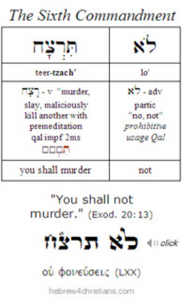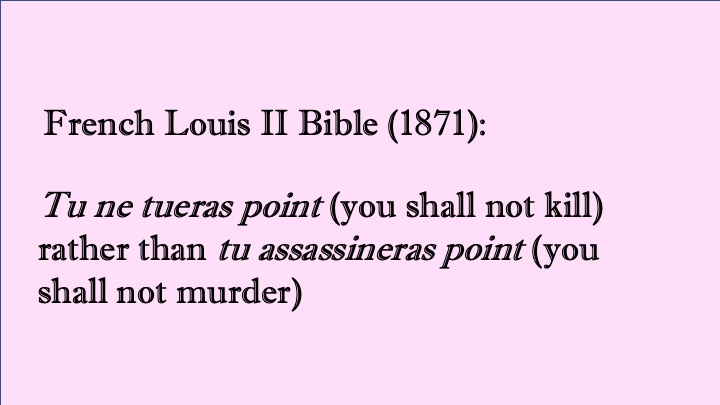In the almost 50 years since Roe v. Wade, the debate over abortion has pervaded politics in the United States. Many people see abortion as a moral issue because it revolves around discussions about the sanctity of life and the right to privacy. The Bible has been heavily used to fortify the arguments of both sides, but many of these key verses are more complicated once you look to the original Hebrew.
Ten Commandments:
In the Ten Commandments in the Bible, one of the commandments is translated in the King James Version of the Bible as:
“Thou shalt not kill.”

If we look at the Hebrew, however, we see that it states “Thou shalt not murder” which conveys a very different meaning. All murder involves killing, but not all killings are considered murders. Murder represents an unlawful killing, whereas killing could include soldiers, animals, or even bugs. Traditionally, Christian translations of Exodus 20:13, including the King James Version, have favored “Thou shalt not kill.”
We can see that this trend is widespread across other languages as well.
Some Jewish commentators have criticized Christian translators and accused them of distorting the Sixth Commandment so it better conforms to the Christian principle of nonviolence presented in Matthew 5:39.
“But I tell you, do not resist an evil person. If anyone slaps you on the right cheek, turn to them the other cheek also.”
Relative to the New Testament, the Old Testament contains more passages of explicit violence, detailing God’s own violent punishments, and passages where God expressly commands others to kill people (Deuteronomy 20:16, 1 Samuel 15:3), whereas Christianity focuses on the New Testament and has a much stronger emphasis on loving one’s enemies.
Exodus 21:22-25
Another verse that has played a central role concerning the permissibility of abortion is Exodus 21:22-25. This verse is extremely difficult to interpret, leading to a lot of ambiguity around the true meaning of the text. As a result, it has been used by both sides in the debate surrounding abortion.
Revised Standard Version:
“When men strive together, and hurt a woman with child, so that there is a miscarriage, and yet no harm follows, the one who hurt her shall be fined, according as the woman’s husband shall lay upon him; and he shall pay as the judges determine. If any harm follows, then you shall give life for life, eye for eye, tooth for tooth, hand for hand, foot for foot, burn for burn, wound for wound, stripe for stripe.”
The RSV states that a “miscarriage” happens, implying the fetus is born dead. This loss of the unborn is considered as no “harm,” since it states that “no harm follows.” Since there is no “real” harm, the one who commits the crim only has to pay a fine. This translation seems to associate the unborn with little value, since a fine is sufficient enough punishment for the crime. If “harm follows,” as in the woman is hurt, then the punishment is life for life.
New International Version:
“If men who are fighting hit a pregnant woman and she gives birth prematurely but there is no serious injury, the offender must be fined whatever the woman’s husband demands and the court allows. But if there is serious injury, you are to take life for life.”
The NIV states that a premature live birth occurs, instead of a miscarriage. The RSV translation is used by pro-choice activists because the wellbeing of the mother is prioritized over the rights of the unborn. The fetus is not treated with the same rights as the mother, since the miscarriage is not counted as serious of a loss to be recompensed life for life. A fine suffices as recompense for loss of the life of the fetus, whereas if “harm follows” and the woman gets hurt, then the punishment becomes eye for eye. In the NIV, the unborn is treated the same as the mother because any injury to the child is included in “harm follows,” meaning the punishment shall be life for life. The American company Biblica is responsible for being the word “homosexual” to German Bibles also published the NIV translation, which raises questions on whether or not the company is trying to further a socially conservative agenda.
Having said all that, some scholars claim there is strong evidence that the miscarriage interpretation of the Revised Standard Version is not the correct one. The word in question in Exodus 21:22 is the same word used in Genesis 25:26 to describe a normal, live birth. In Exodus 23:26, the normal Hebrew word for miscarriage is used, which is distinct from the word in Exodus 21:22, implying that it does not convey miscarriage. Furthermore, the word used for “harm” is left indefinite and does not indicate the child or the mother. If it was meant to apply exclusively to the mother, a feminine pronoun would have accompanied it.
The right to abortion is a very serious concern for many women, so it is dangerous to just throw around scripture, especially since these verses are not as black-and-white as some present them to be. We must thoroughly analyze the verses at the center of this conversation in order to prevent people’s rights being infringed upon.




